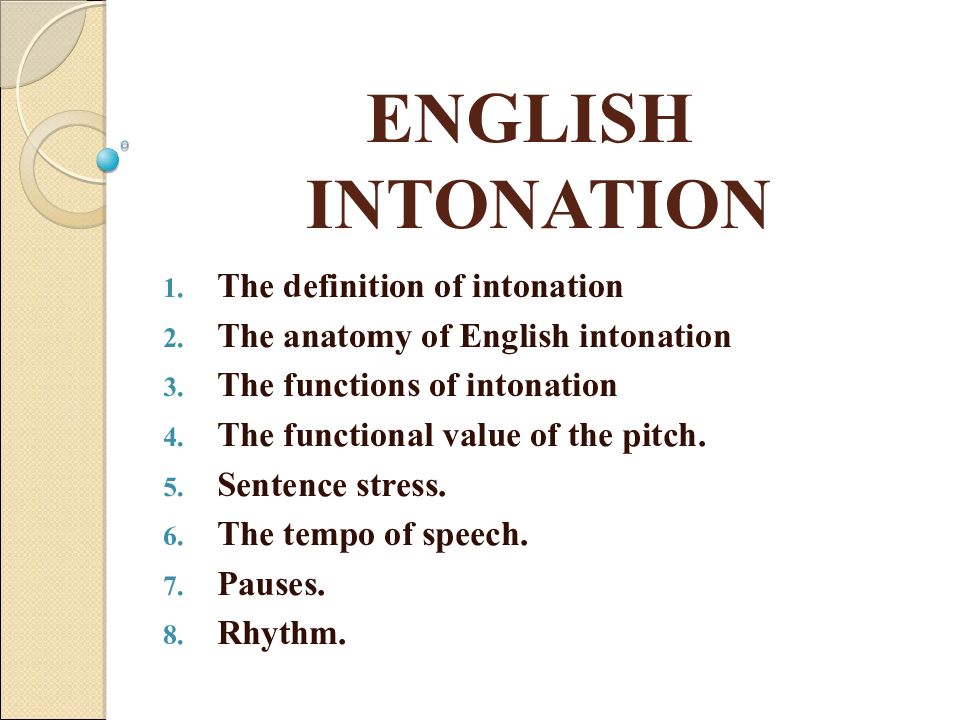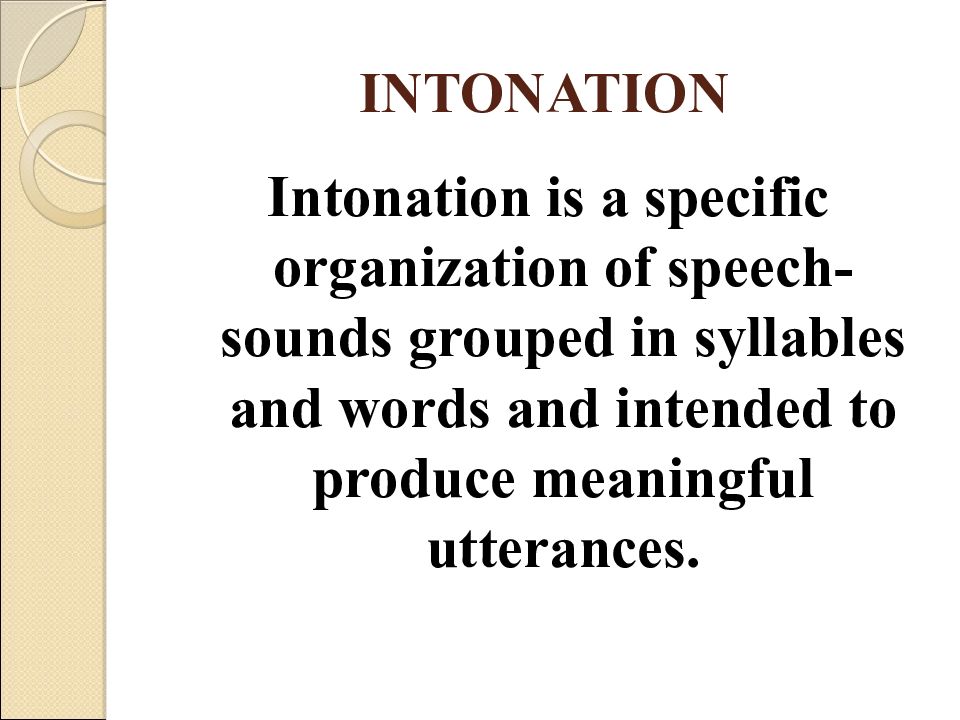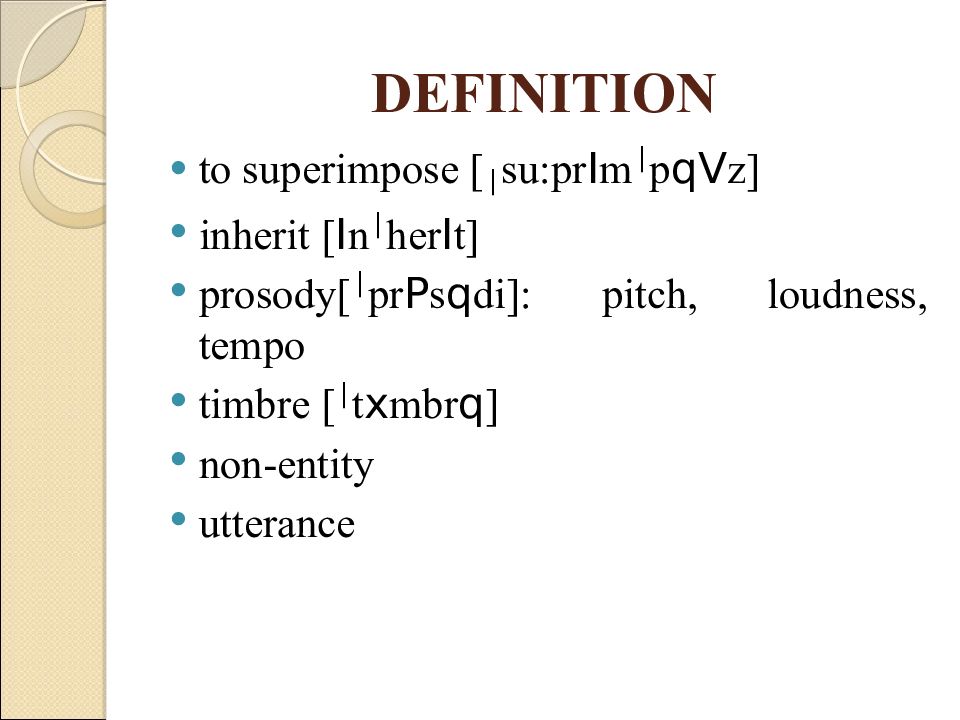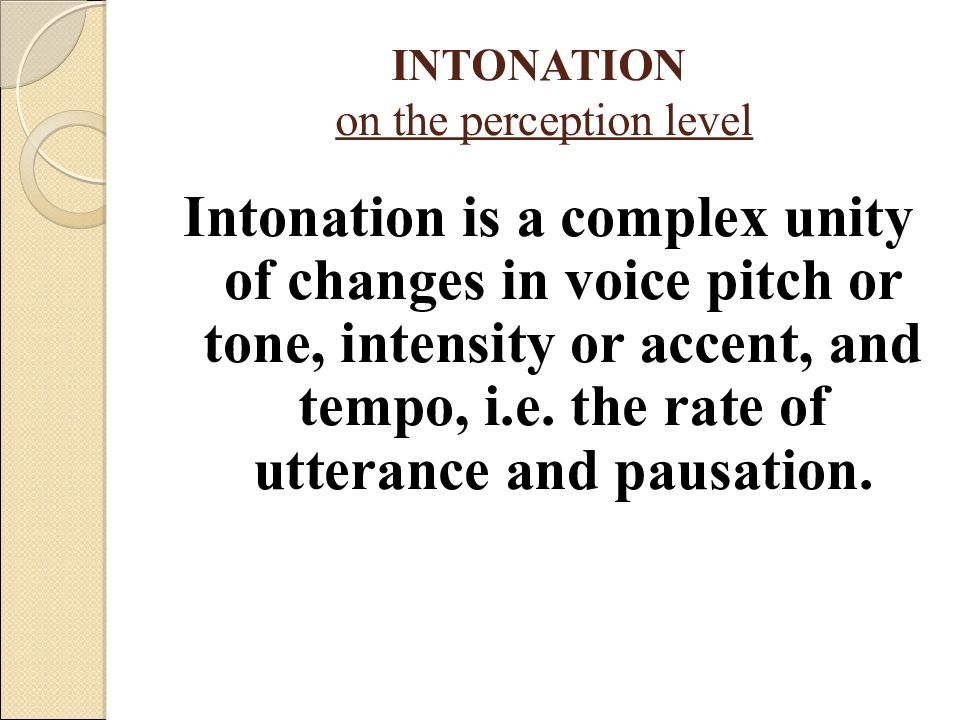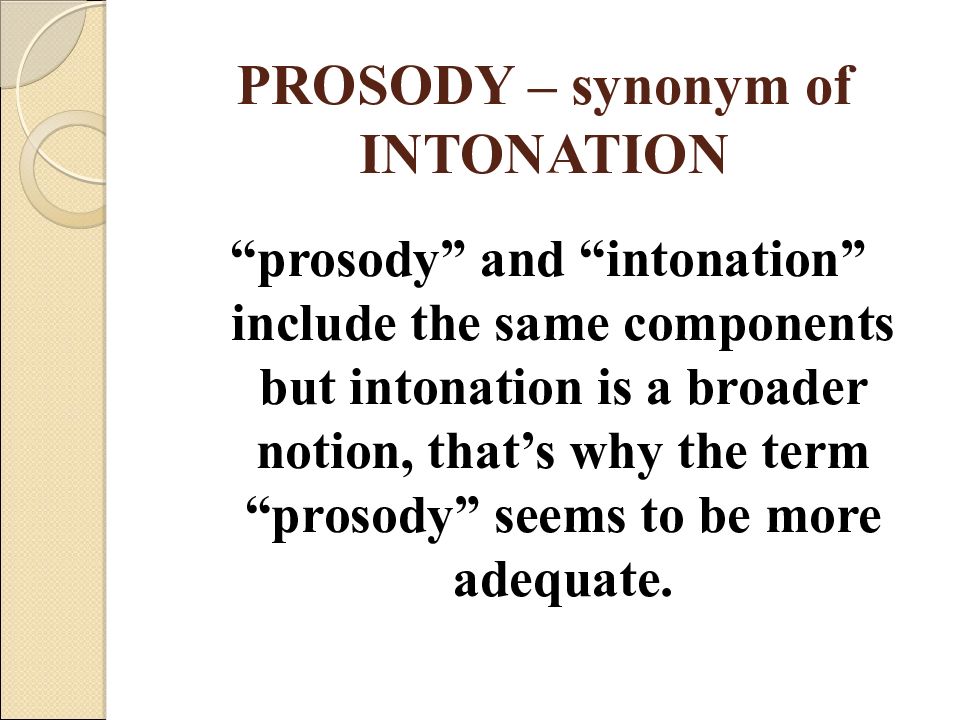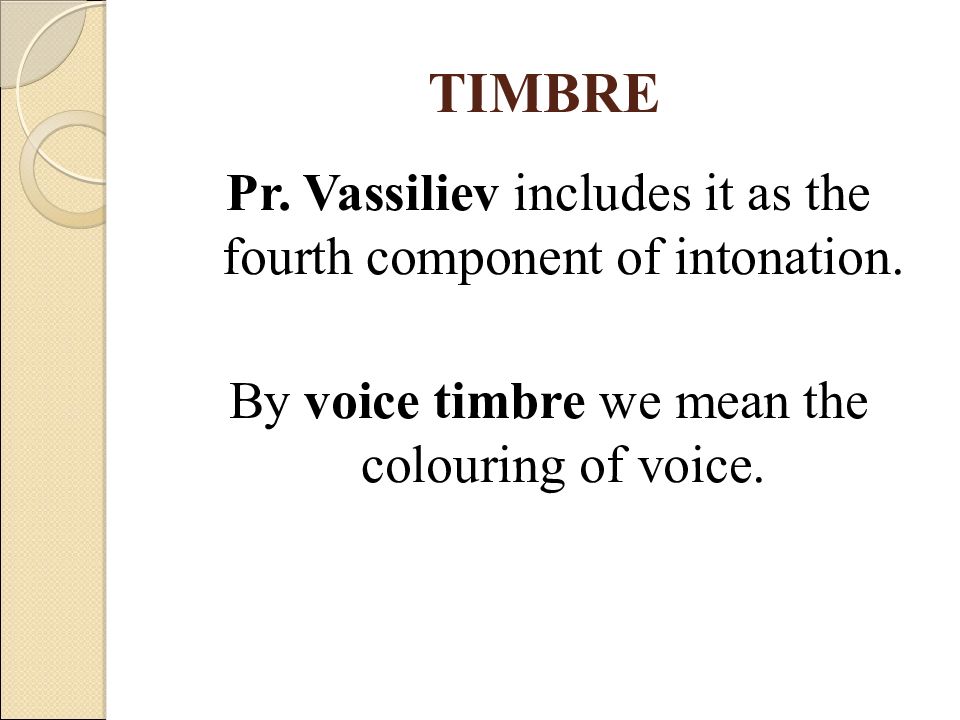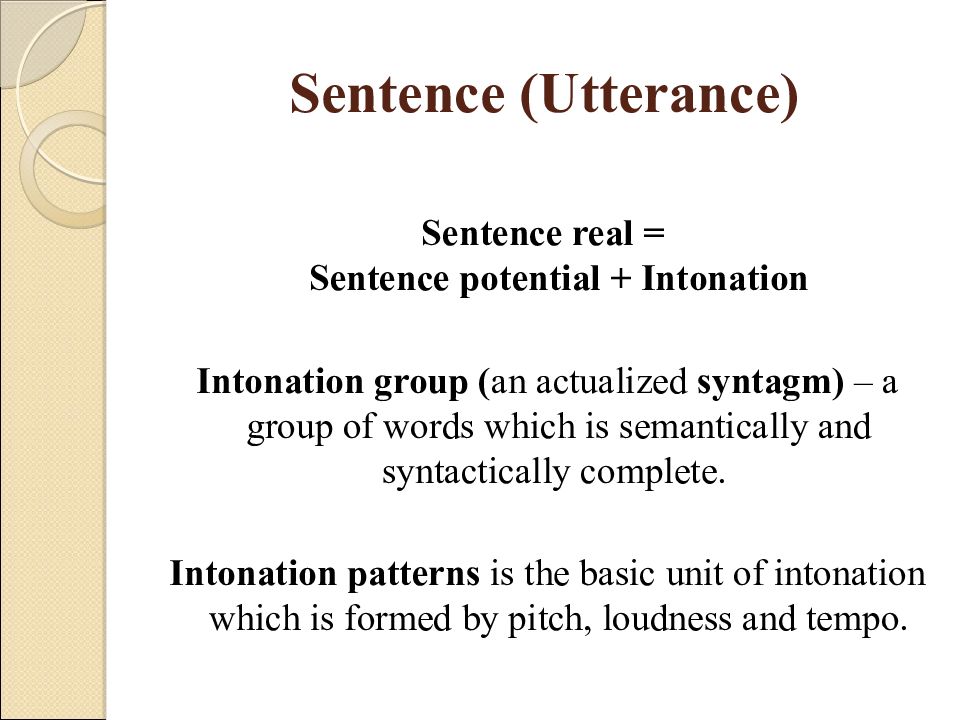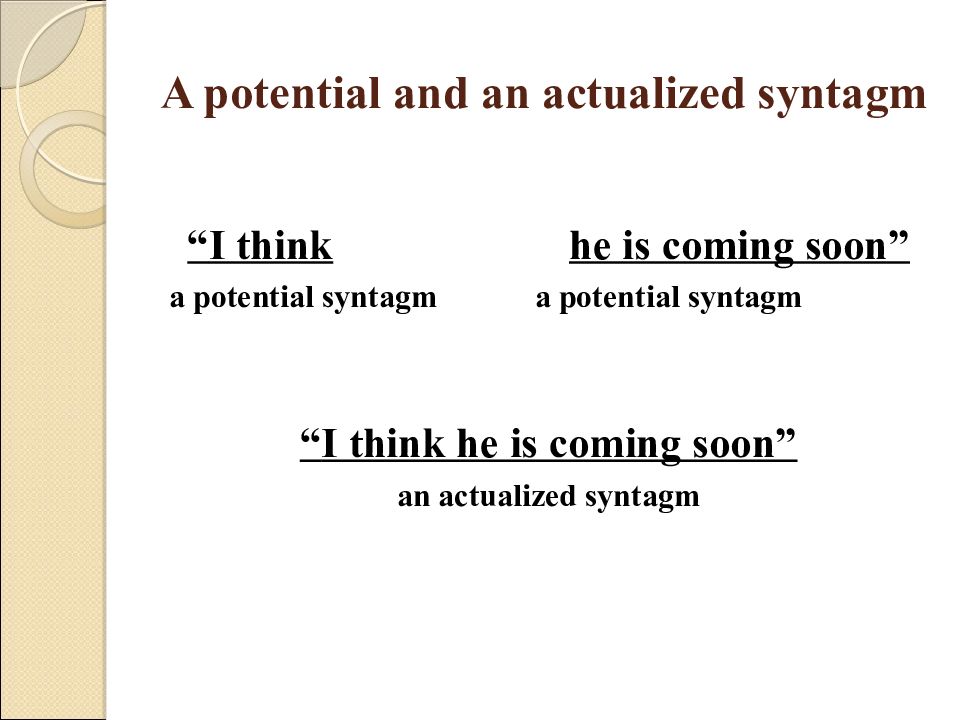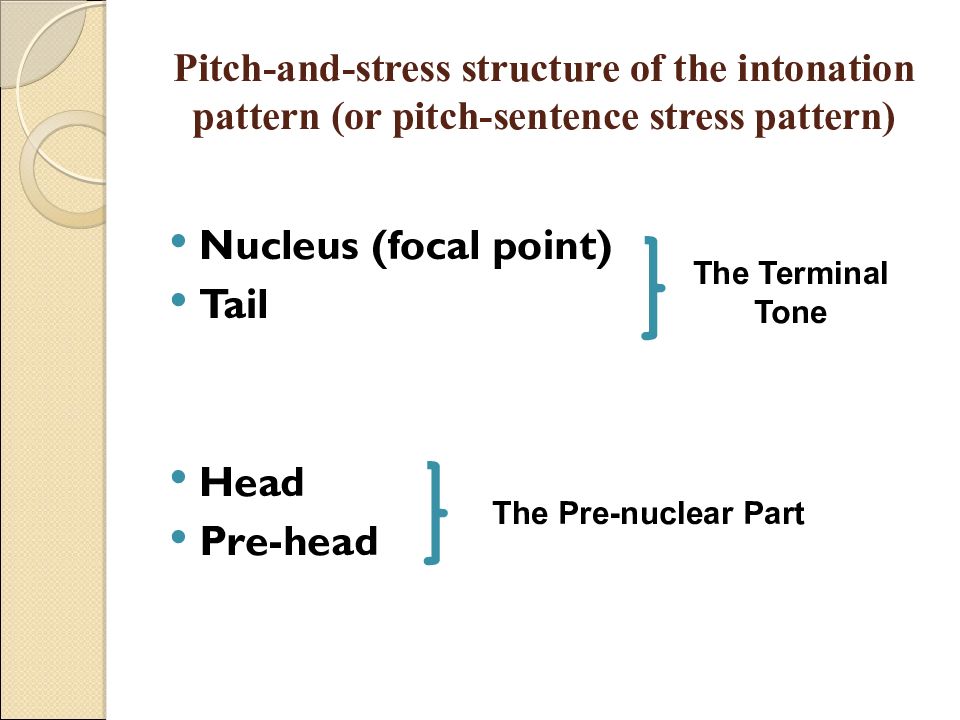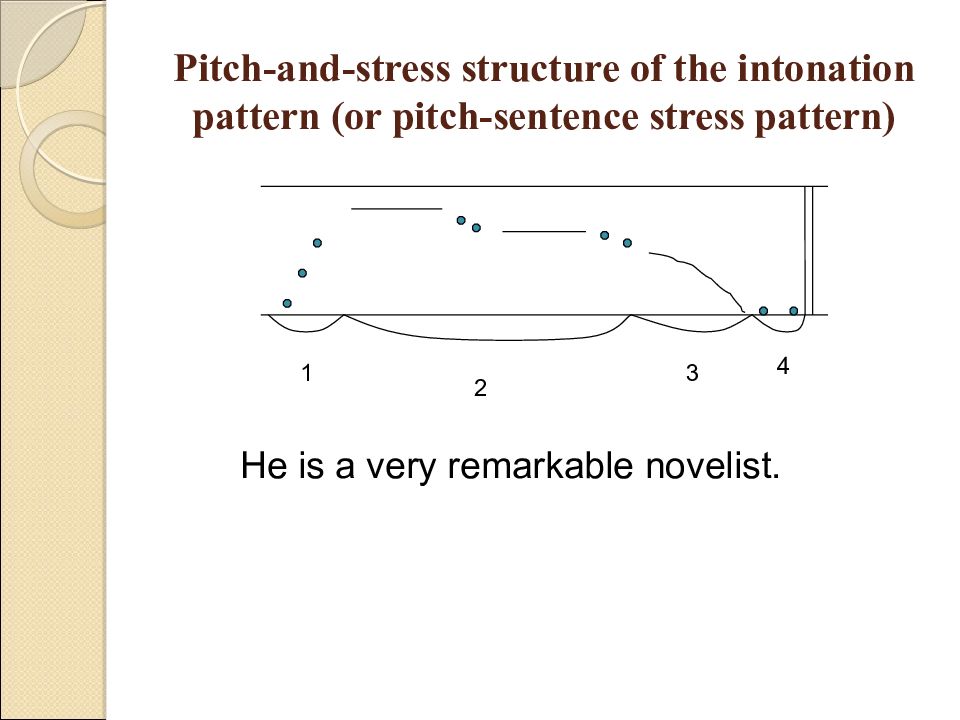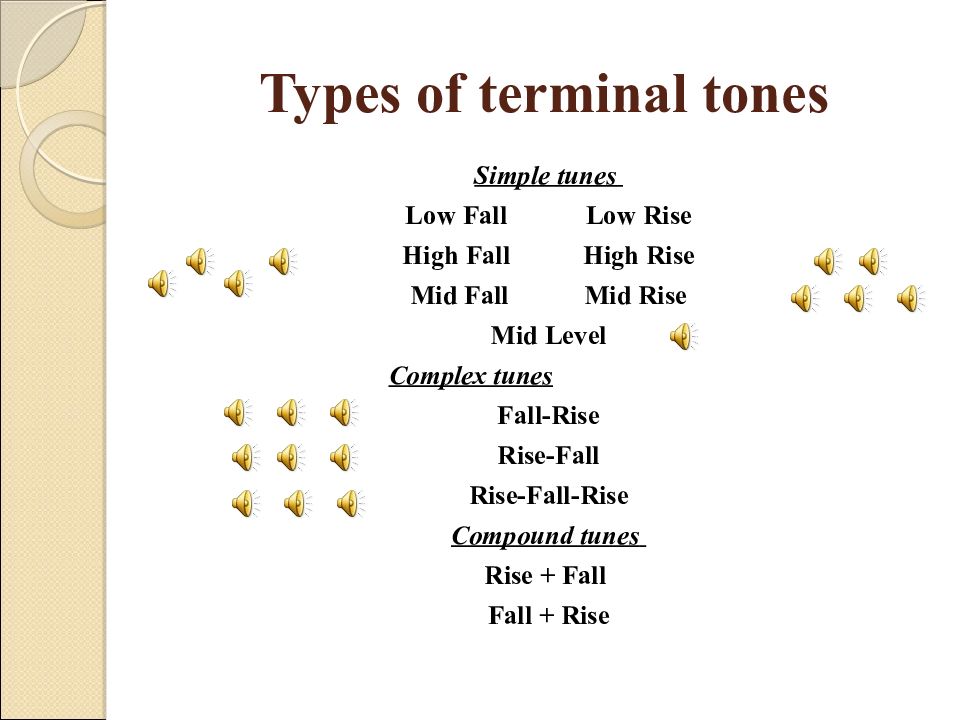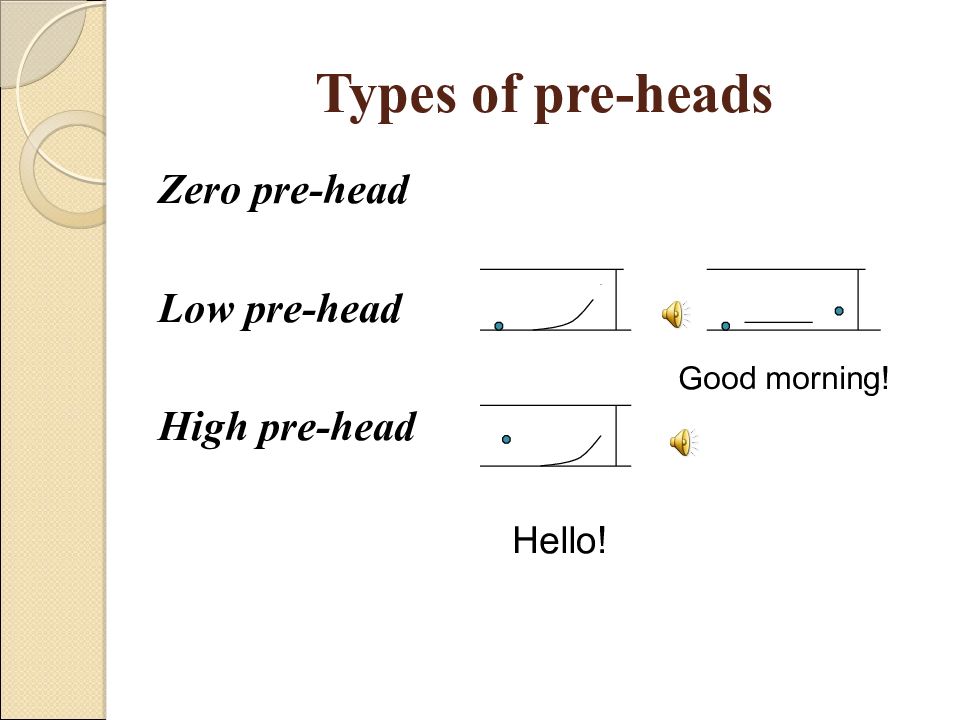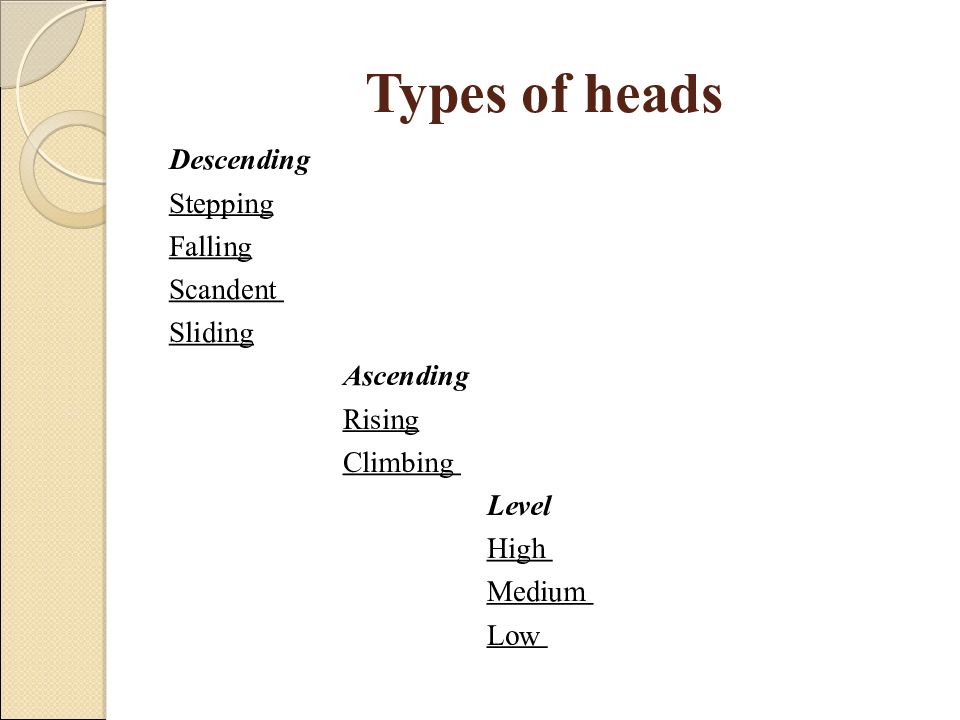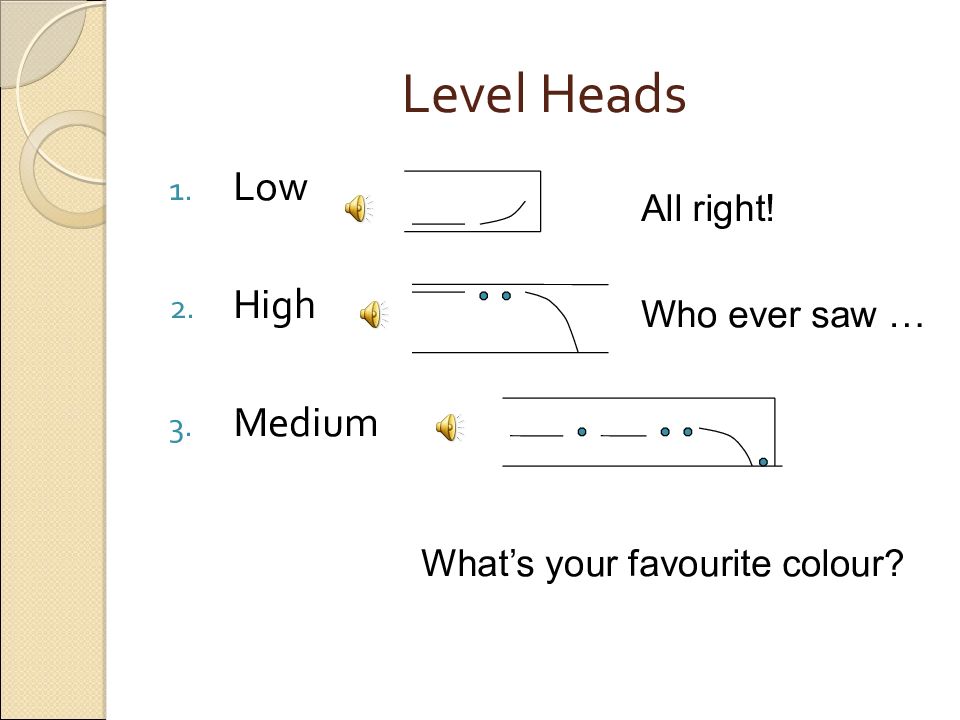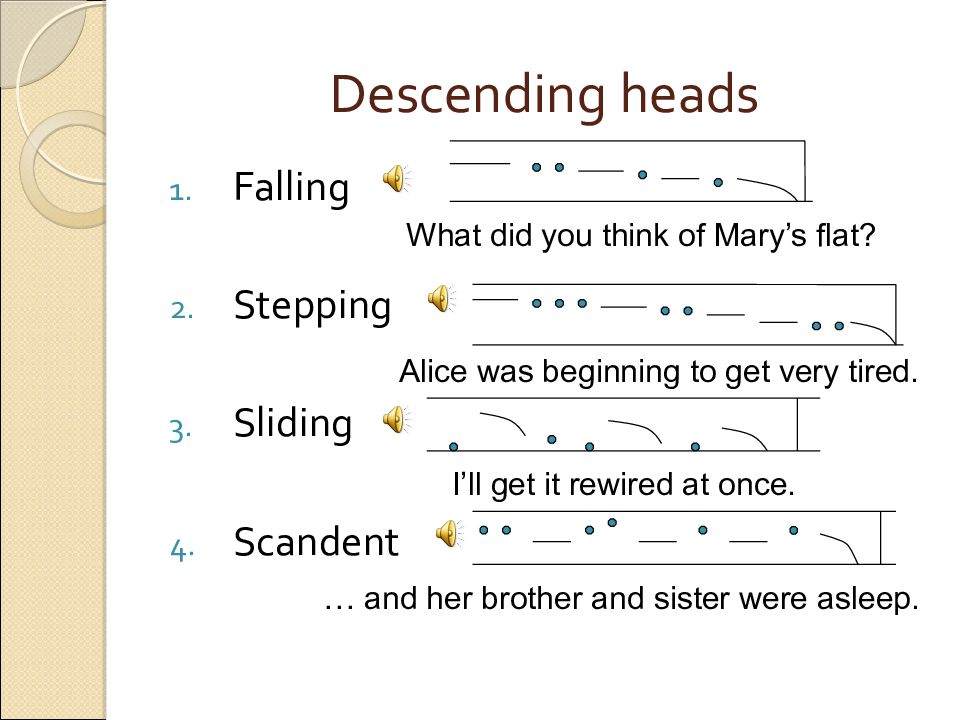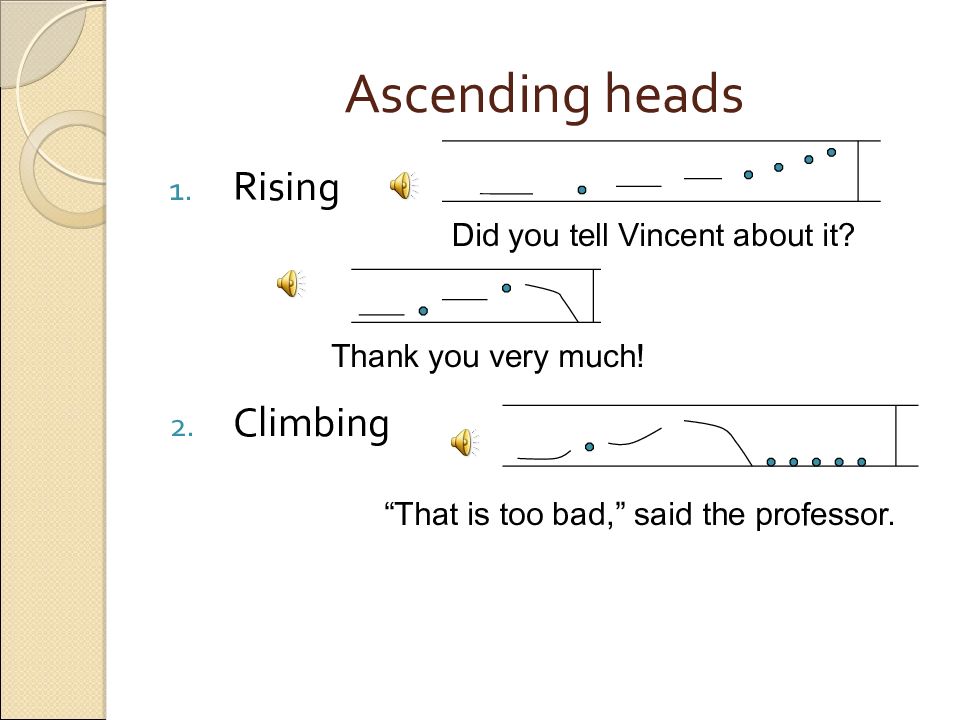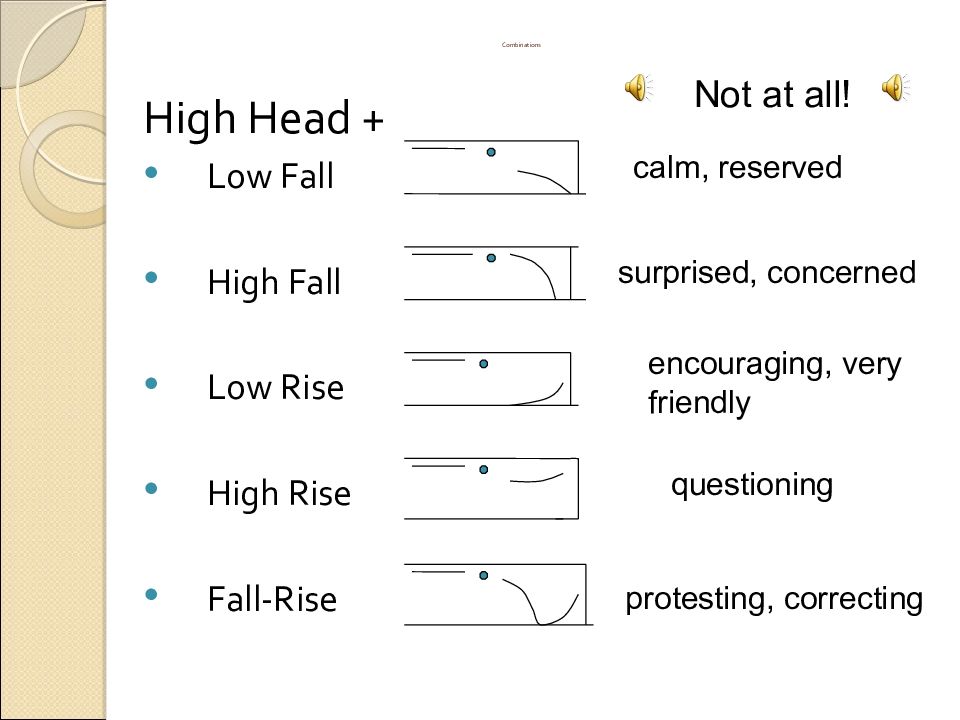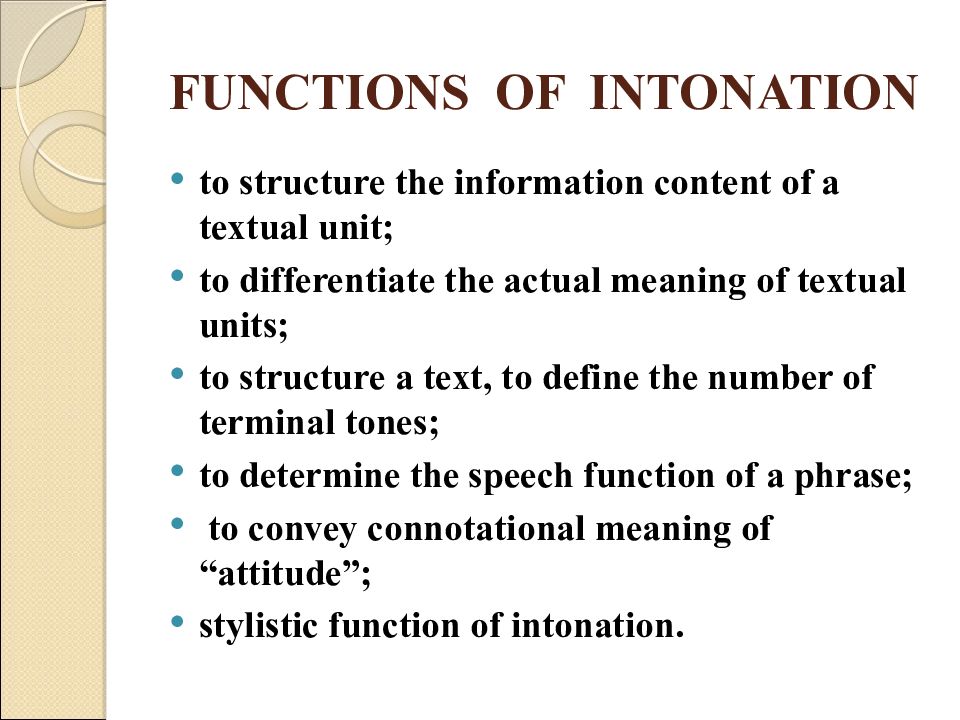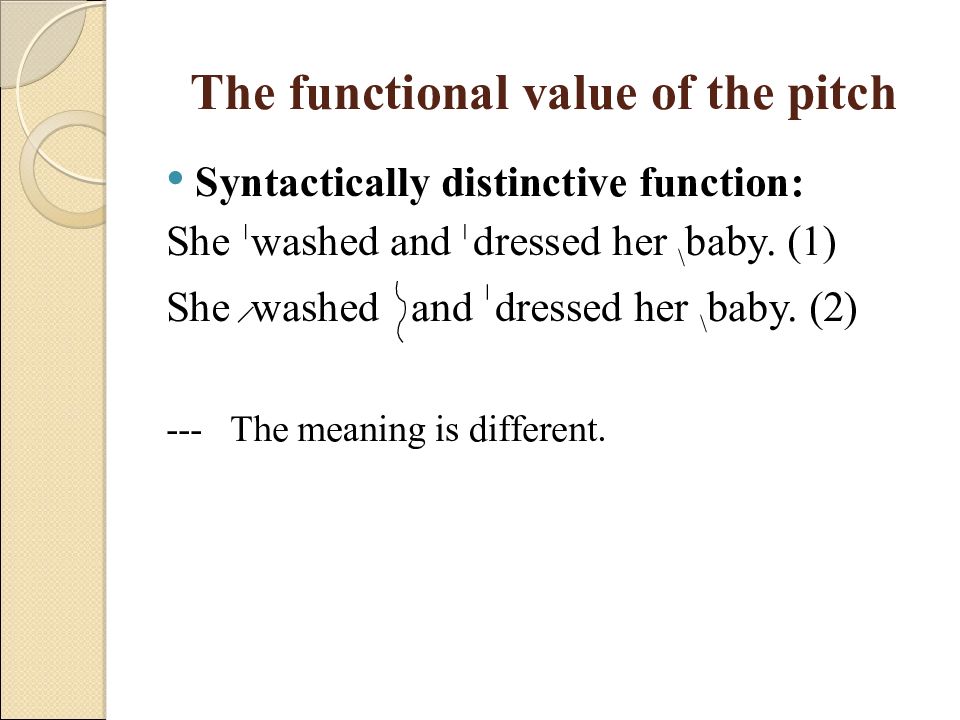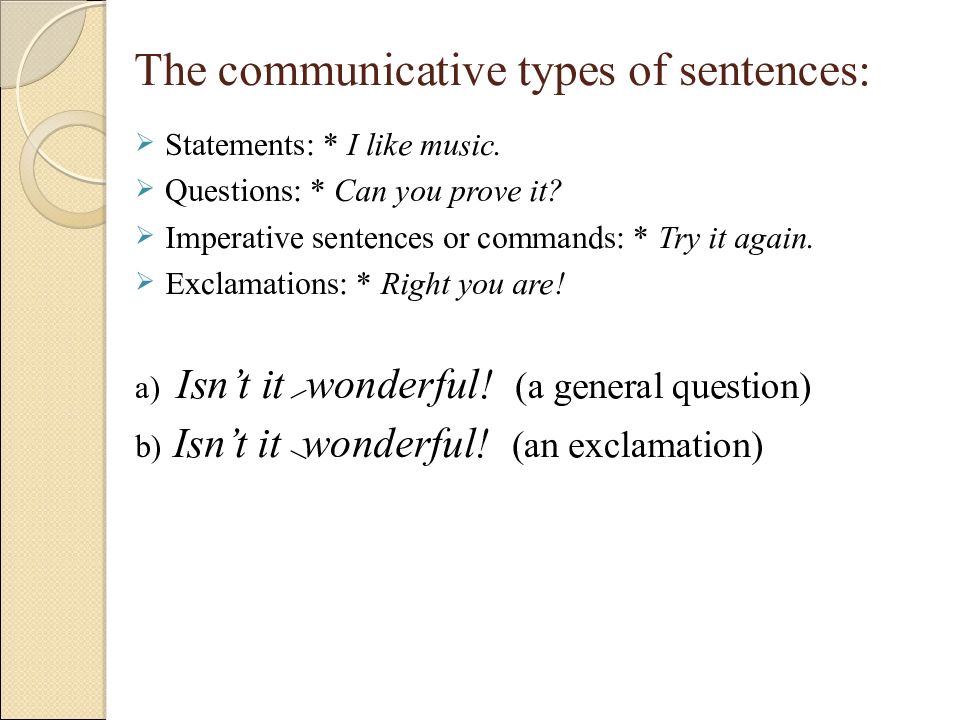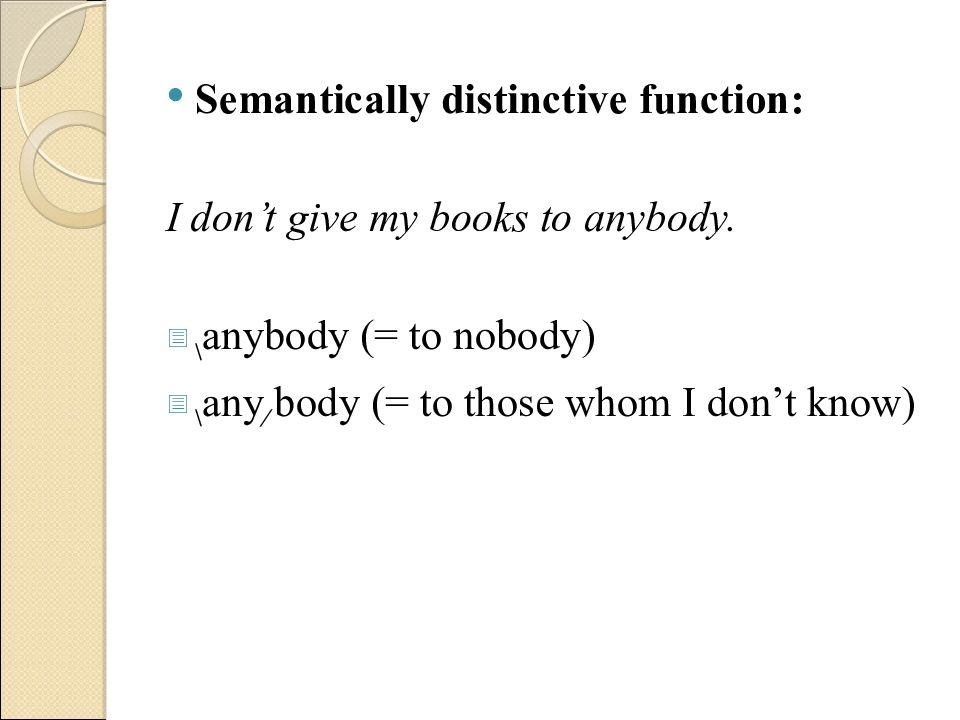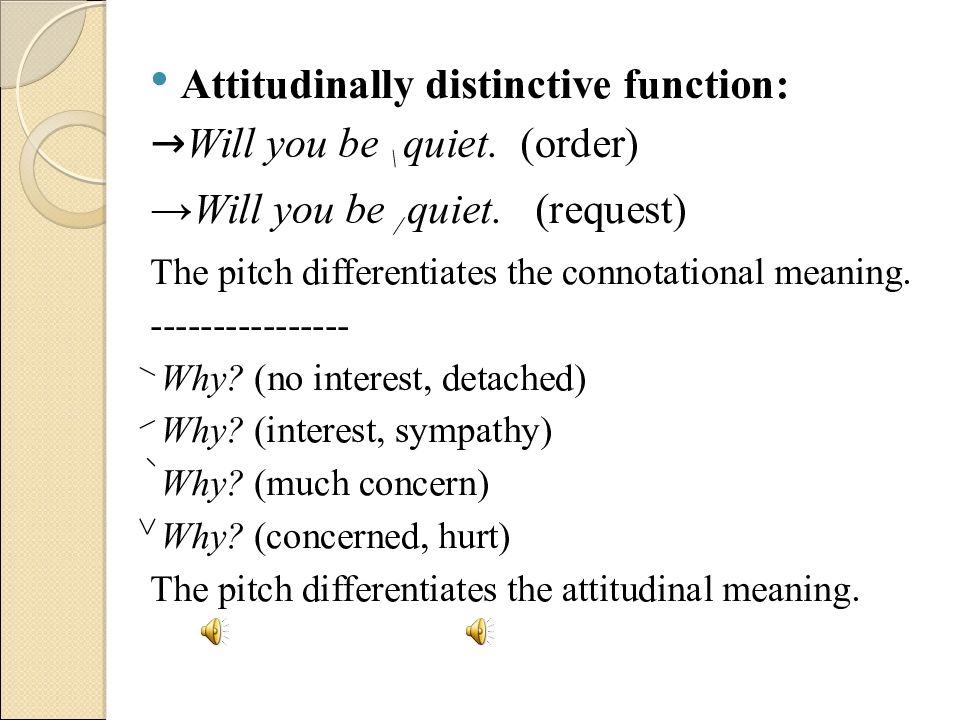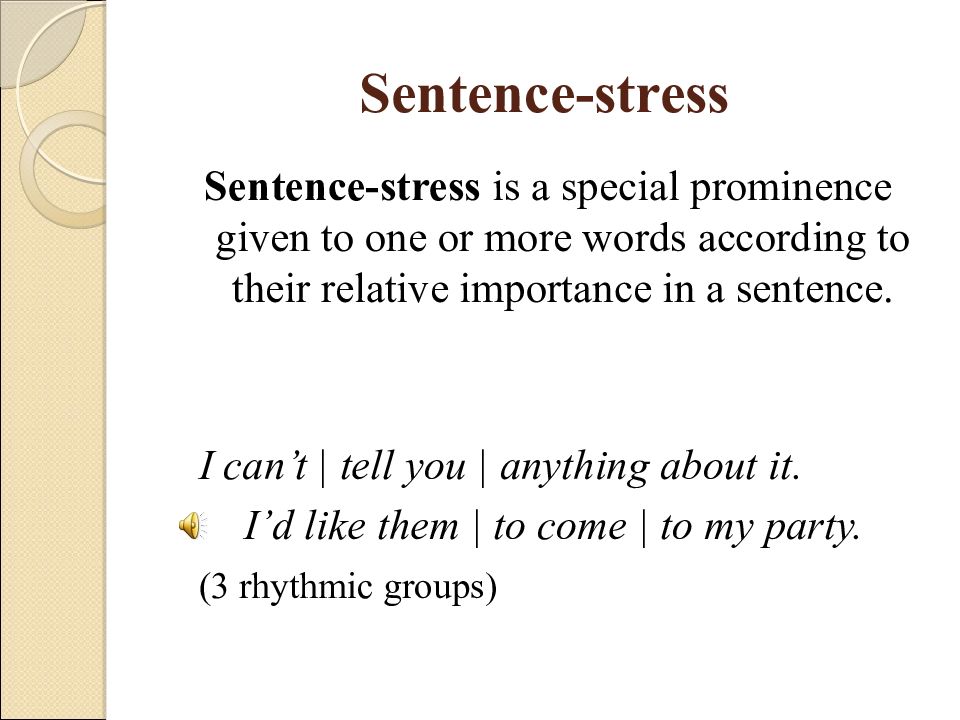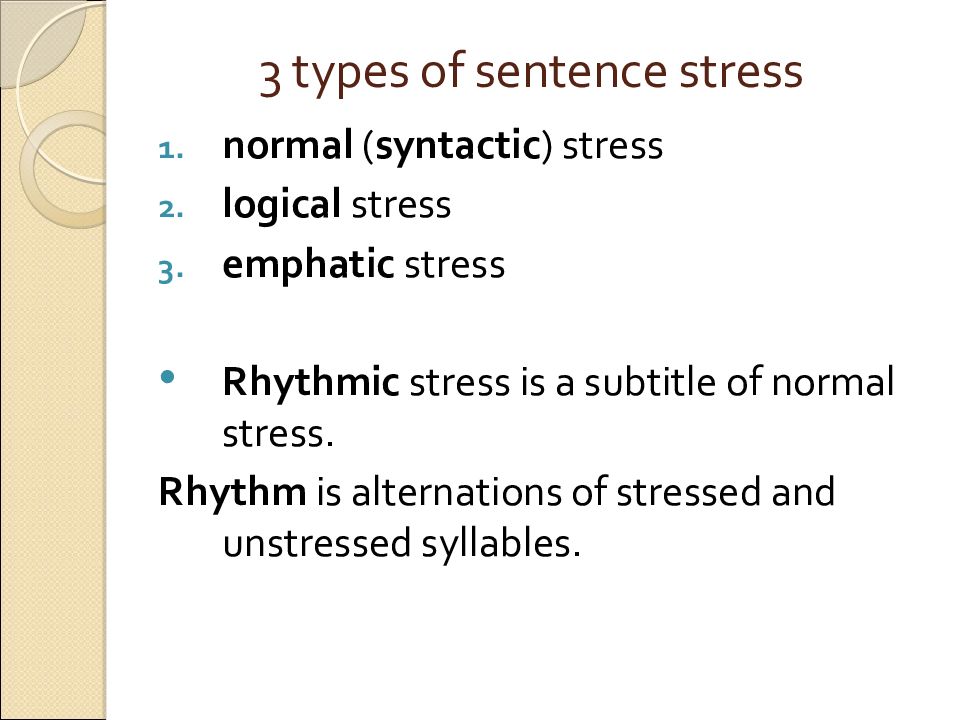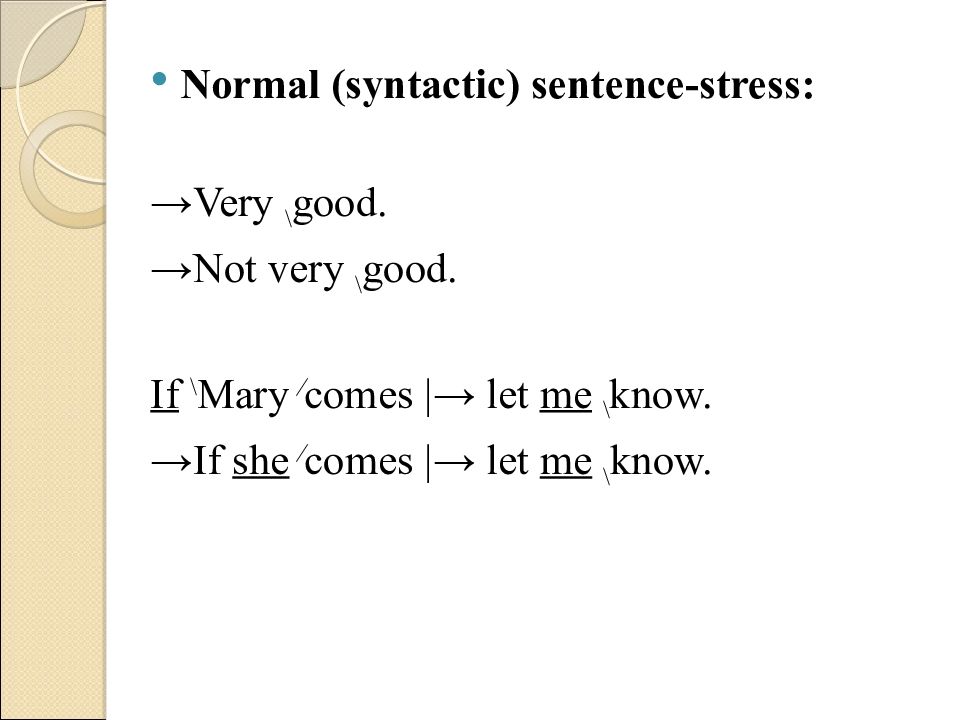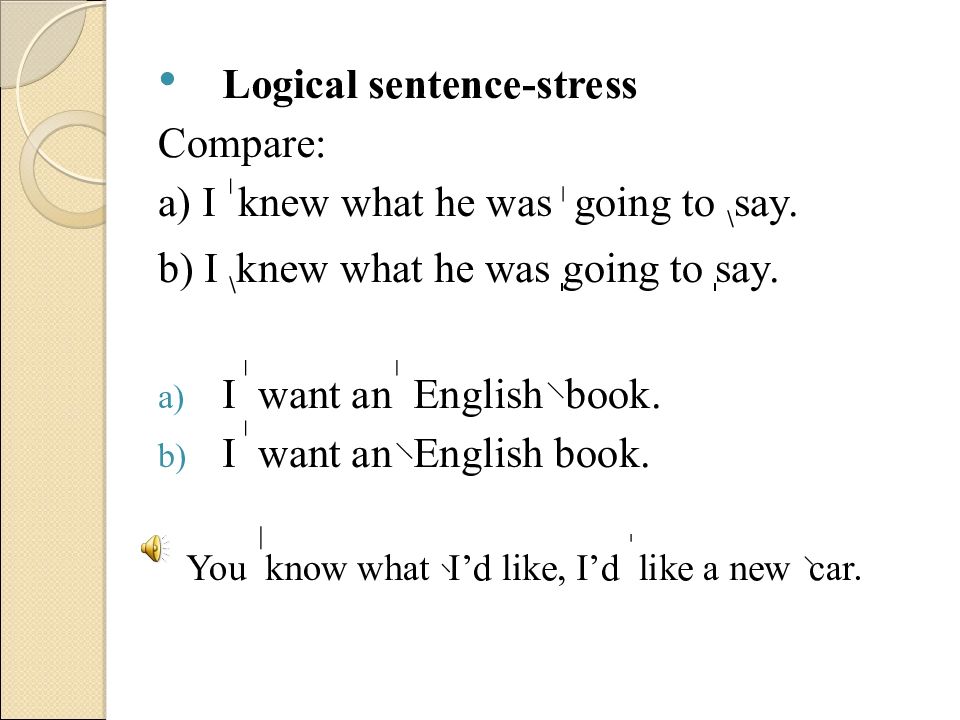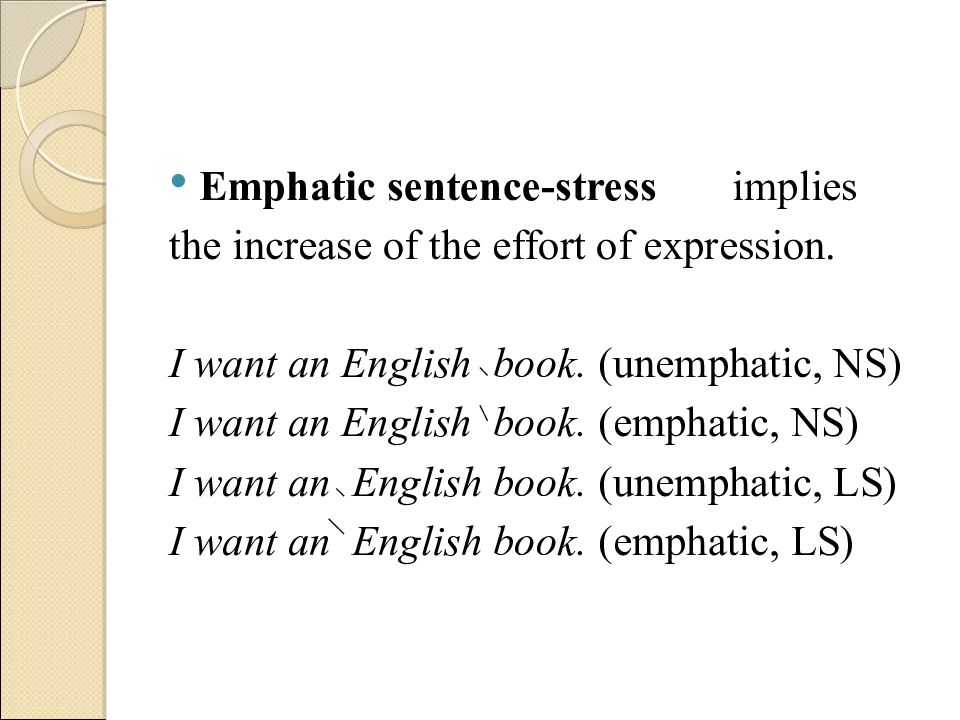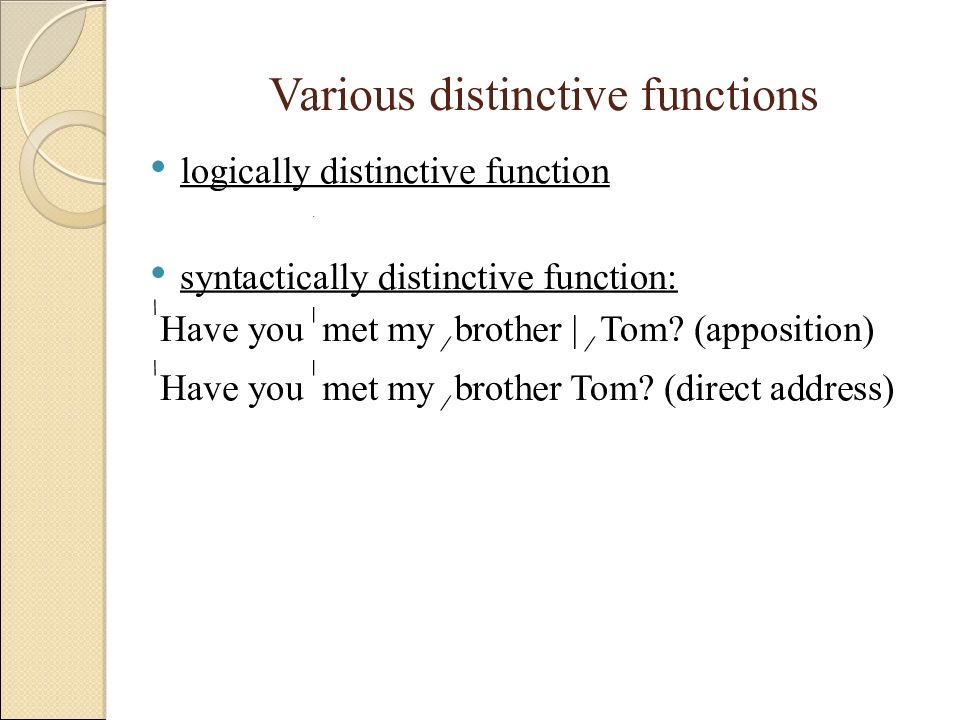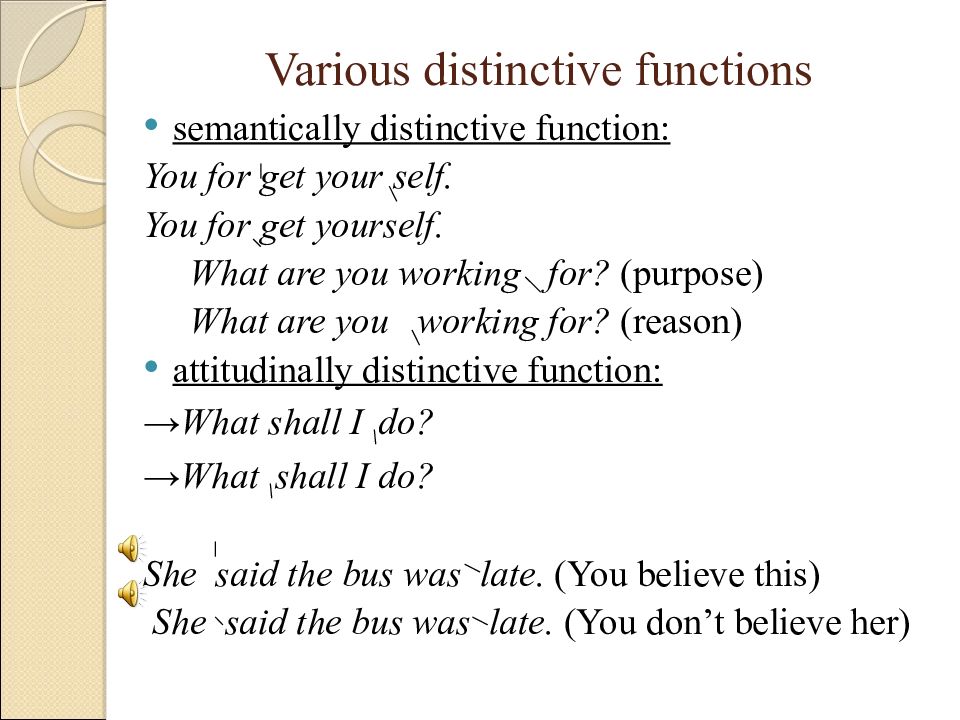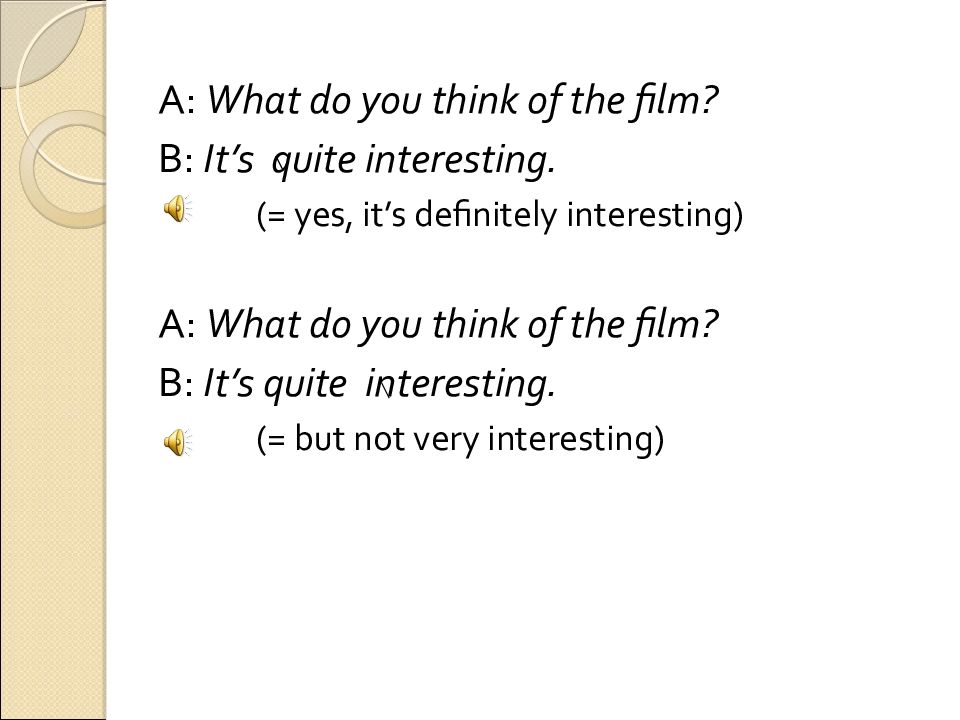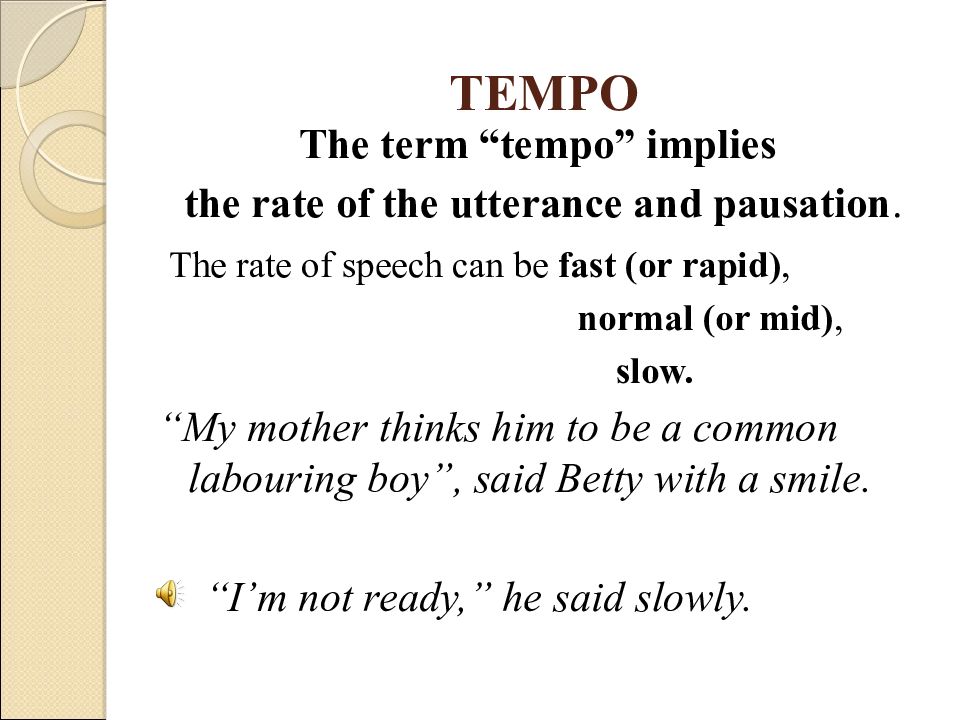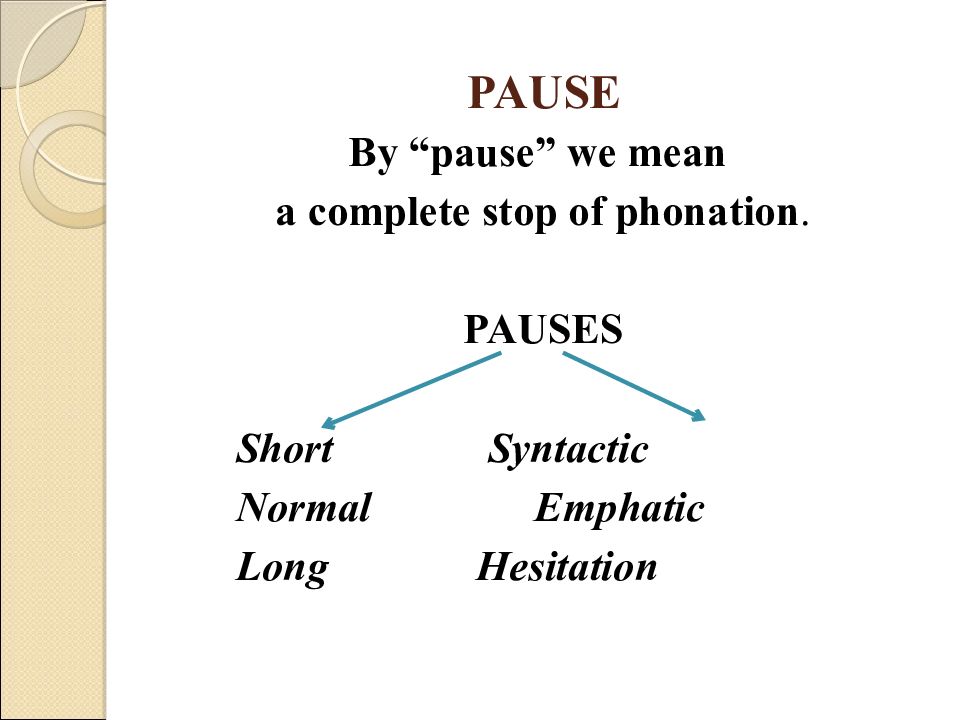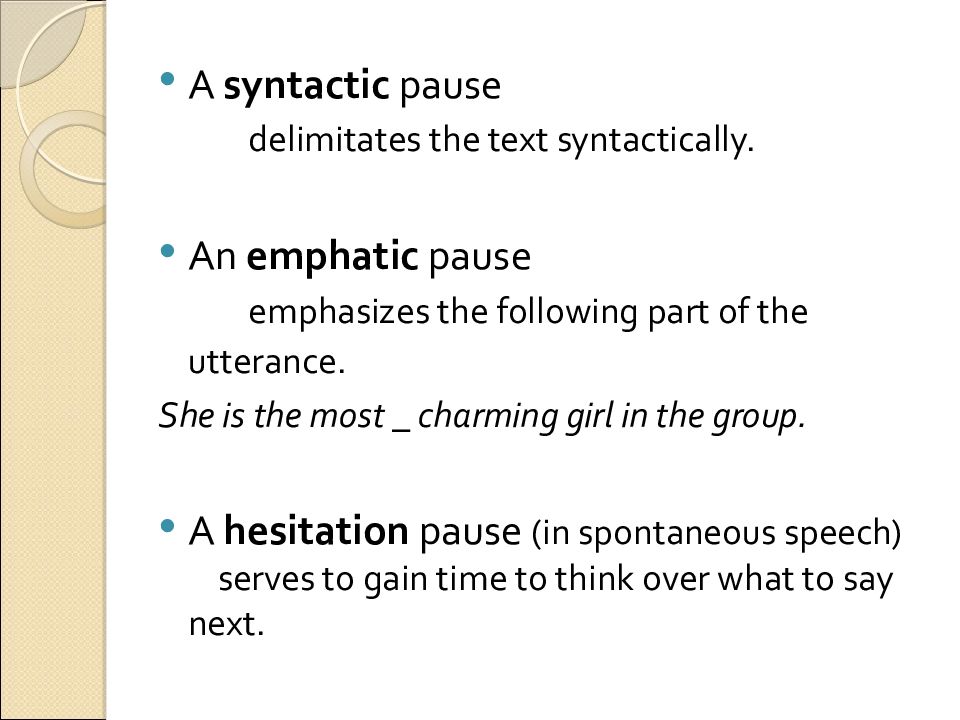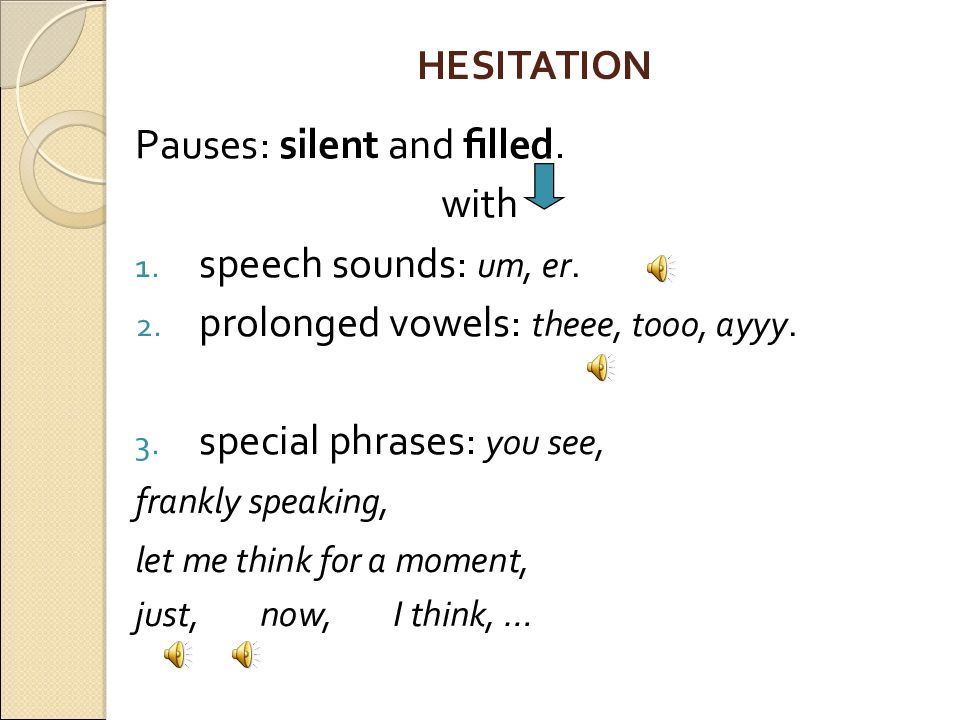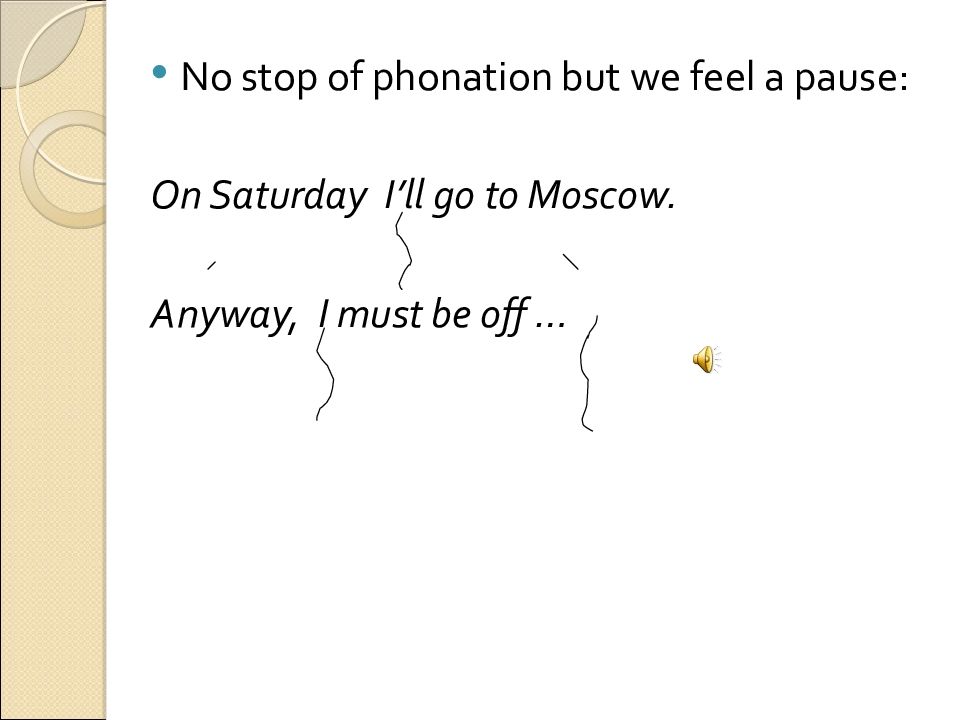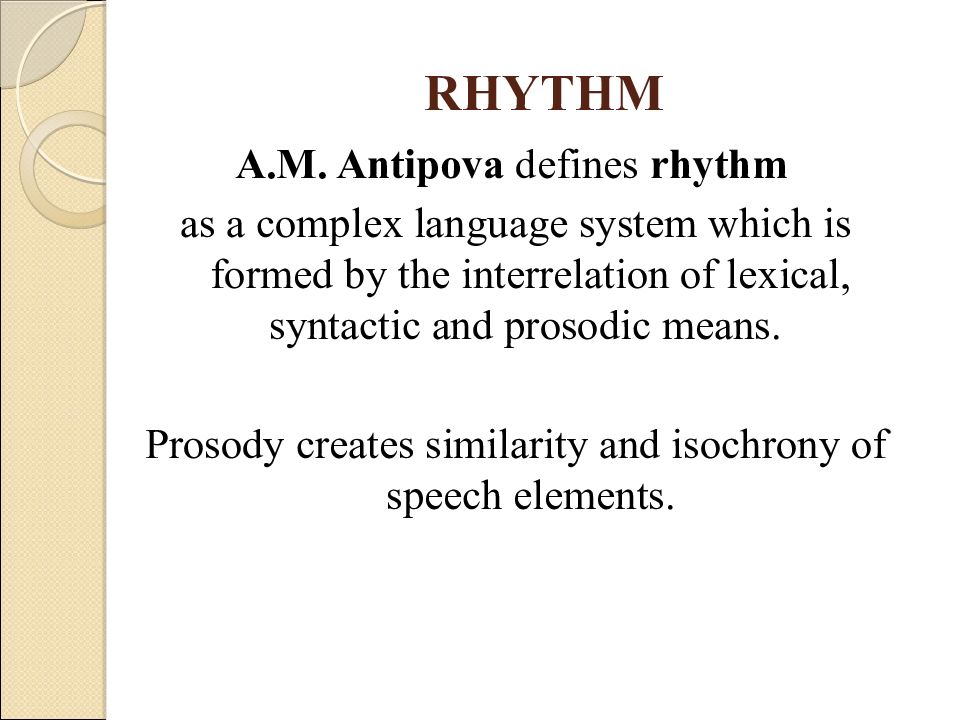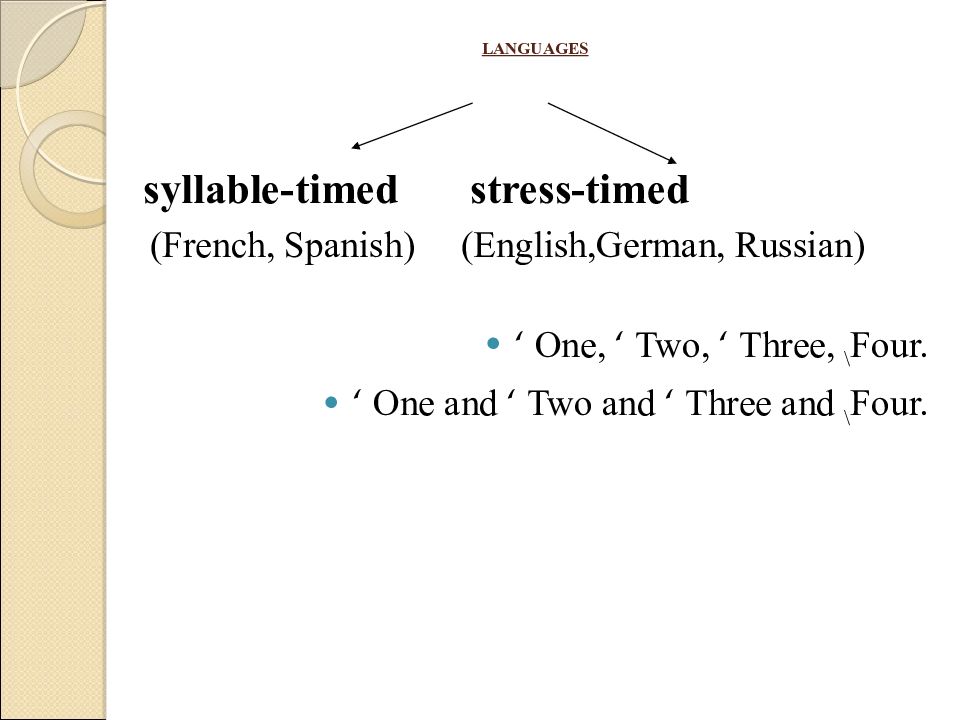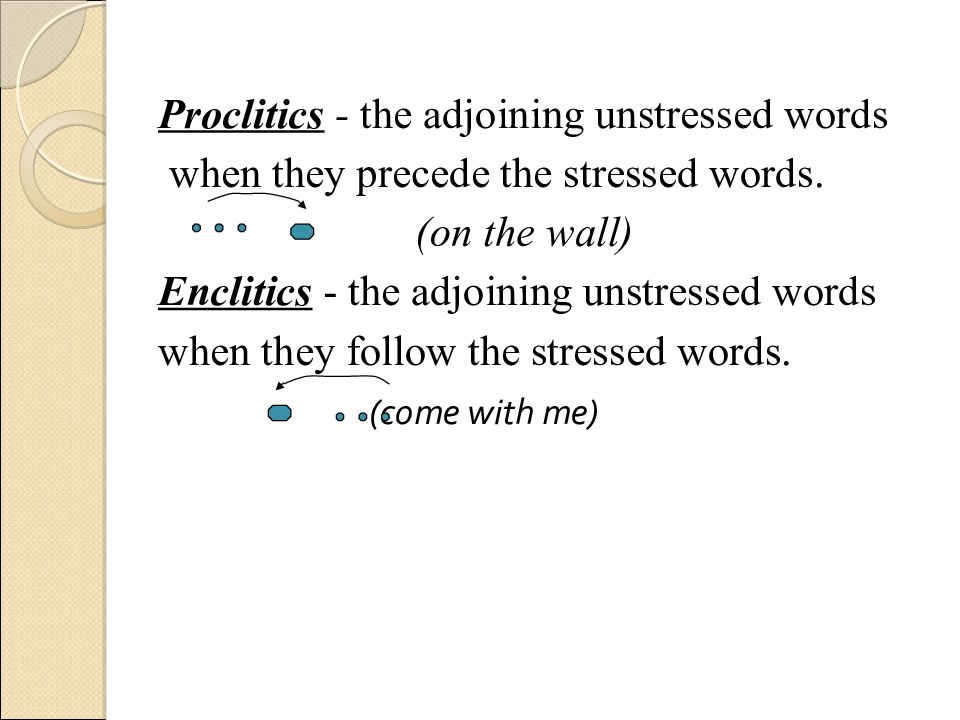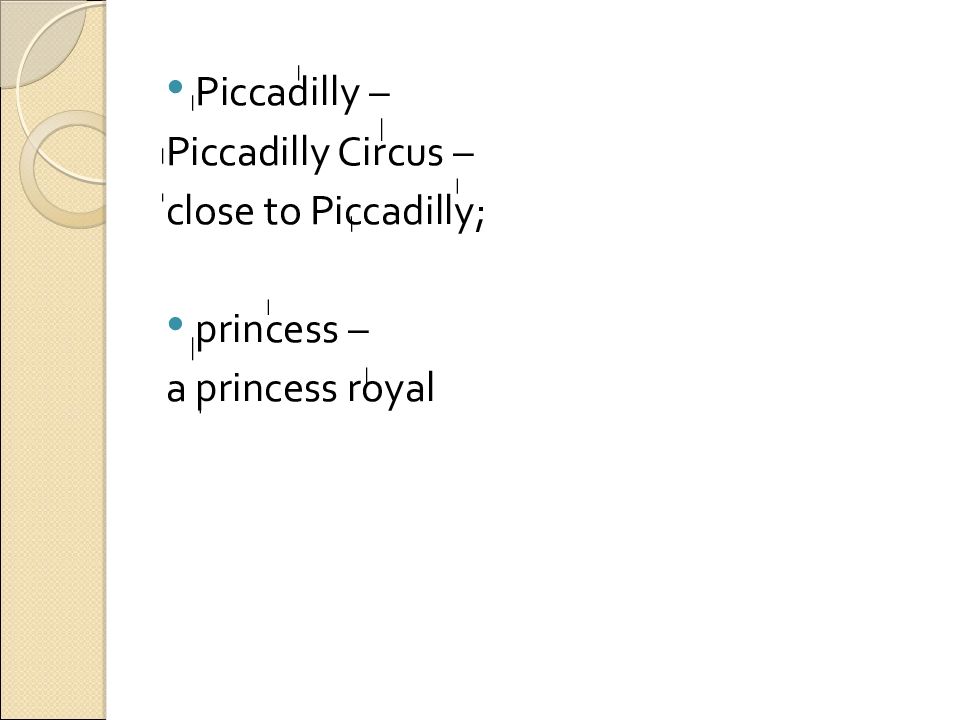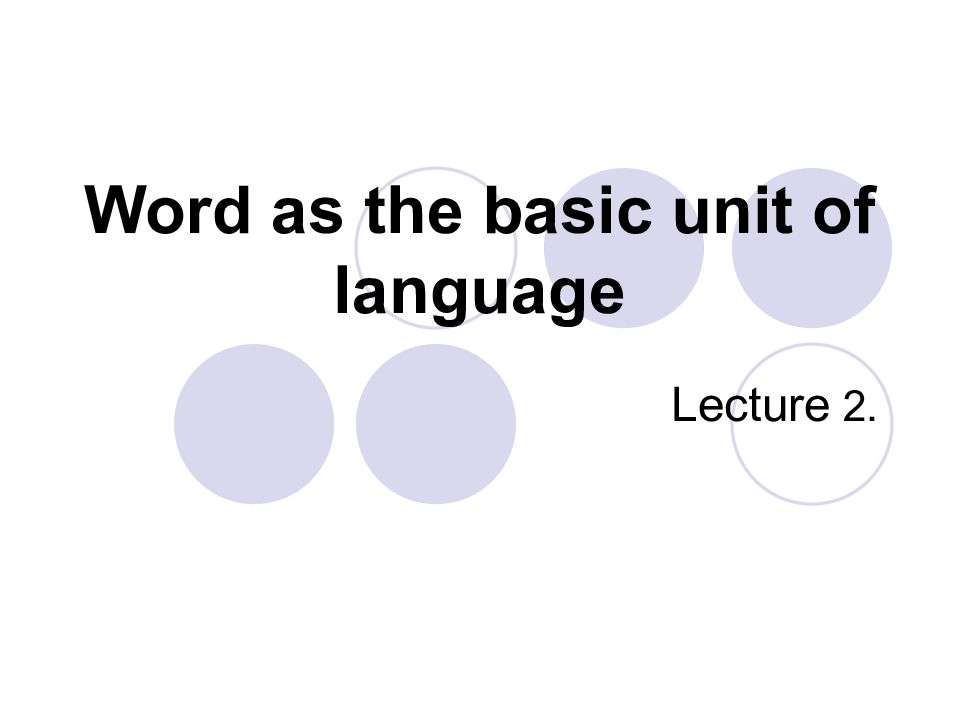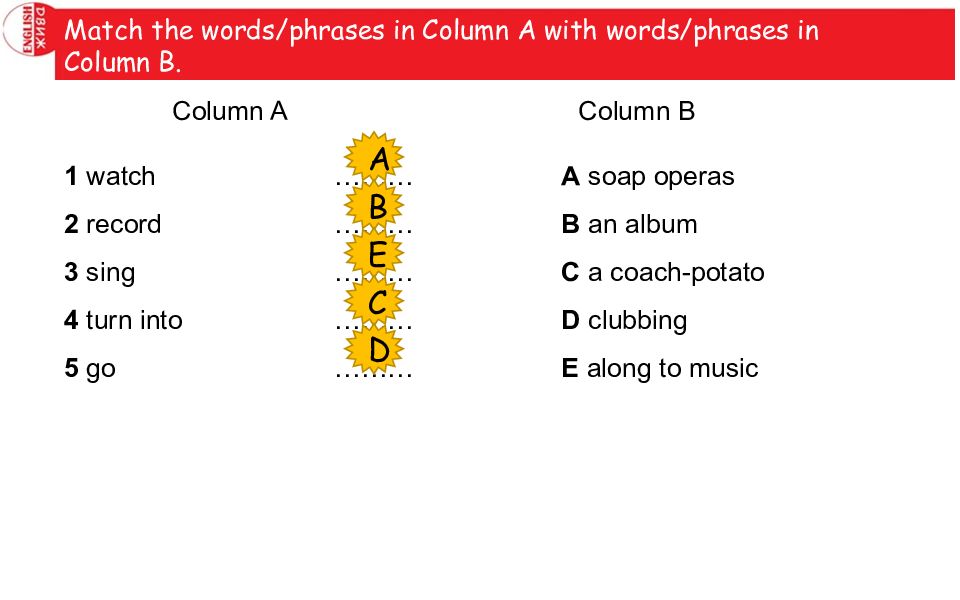Первый слайд презентации: ENGLISH INTONATION
The definition of intonation The anatomy of English intonation The functions of intonation The functional value of the pitch. Sentence stress. The tempo of speech. Pauses. Rhythm.
Слайд 2: INTONATION
Intonation is a specific organization of speech-sounds grouped in syllables and words and intended to produce meaningful utterances.
Слайд 3: DEFINITION
to superimpose [ su:pr I m p qV z] inherit [ I n her I t] prosody[ pr P s q di]: pitch, loudness, tempo timbre [ t x mbr q ] non-entity utterance
Слайд 4: INTONATION on the perception level
Intonation is a complex unity of changes in voice pitch or tone, intensity or accent, and tempo, i.e. the rate of utterance and pausation.
Слайд 5: PROSODY – synonym of INTONATION
“prosody” and “intonation” include the same components but intonation is a broader notion, that’s why the term “prosody” seems to be more adequate.
Слайд 6: TIMBRE
Pr. Vassiliev includes it as the fourth component of intonation. By voice timbre we mean the colouring of voice.
Слайд 7: Sentence (Utterance)
Sentence real = Sentence potential + Intonation Intonation group ( an actualized syntagm ) – a group of words which is semantically and syntactically complete. Intonation patterns is the basic unit of intonation which is formed by pitch, loudness and tempo.
Слайд 8: A potential and an actualized syntagm
“I think he is coming soon” a potential syntagm a potential syntagm “I think he is coming soon” an actualized syntagm
Nucleus (focal point) Tail Head Pre-head The Terminal Tone The Pre-nuclear Part
1 2 3 4 He is a very remarkable novelist.
Слайд 11: Types of terminal tones
Simple tunes Low Fall Low Rise High Fall High Rise Mid Fall Mid Rise Mid Level Complex tunes Fall-Rise Rise-Fall Rise-Fall-Rise Compound tunes Rise + Fall Fall + Rise
Слайд 12: Types of pre-heads
Zero pre-head Low pre-head High pre-head Hello! Good morning!
Слайд 13: Types of heads
Descending Stepping Falling Scandent Sliding Ascending Rising Climbing Level High Medium Low
Слайд 14: Level Heads
Low High Medium All right! Who ever saw … What’s your favourite colour?
Слайд 15: Descending heads
Falling Stepping Sliding Scandent What did you think of Mary’s flat? Alice was beginning to get very tired. I’ll get it rewired at once. … and her brother and sister were asleep.
Слайд 16: Ascending heads
Rising Climbing Did you tell Vincent about it? Thank you very much! “That is too bad,” said the professor.
Слайд 17: Combinations
High Head + Low Fall High Fall Low Rise High Rise Fall-Rise Not at all! calm, reserved surprised, concerned encouraging, very friendly questioning protesting, correcting
Слайд 18: FUNCTIONS OF INTONATION
to structure the information content of a textual unit; to differentiate the actual meaning of textual units; to structure a text, to define the number of terminal tones; to determine the speech function of a phrase; to convey connotational meaning of “attitude”; stylistic function of intonation.
Слайд 19: The functional value of the pitch
Syntactically distinctive function: She washed and dressed her \ baby. (1) She washed and dressed her \ baby. (2) --- The meaning is different.
Слайд 20: The communicative types of sentences:
Statements: * I like music. Questions: * Can you prove it? Imperative sentences or commands: * Try it again. Exclamations: * Right you are! a) Isn’t it wonderful! (a general question) b) Isn’t it wonderful! (an exclamation) The communicative types of sentences:
Слайд 21
Semantically distinctive function: I don’t give my books to anybody. \ anybody (= to nobody) \ any ⁄ body (= to those whom I don’t know)
Слайд 22
Attitudinally distinctive function: → Will you be \ quiet. (order) → Will you be ⁄ quiet. (request) The pitch differentiates the connotational meaning. ---------------- Why? (no interest, detached) Why? (interest, sympathy) Why? (much concern) Why? (concerned, hurt) The pitch differentiates the attitudinal meaning.
Слайд 23: Sentence-stress
Sentence-stress is a special prominence given to one or more words according to their relative importance in a sentence. I can’t | tell you | anything about it. I’d like them | to come | to my party. (3 rhythmic groups)
Слайд 24: 3 types of sentence stress
normal ( syntactic ) stress logical stress emphatic stress Rhythmic stress is a subtitle of normal stress. Rhythm is alternations of stressed and unstressed syllables.
Слайд 25
Normal (syntactic) sentence-stress: →Very \ good. →Not very \ good. If \ Mary ⁄ comes |→ let me \ know. →If she ⁄ comes |→ let me \ know.
Слайд 26
Logical sentence-stress Compare: a) I knew what he was going to \ say. b) I \ knew what he was ֽ going to ֽ say. I want an English book. I want an English book. You know what I’d like, I’d like a new car.
Слайд 27
Emphatic sentence-stress implies the increase of the effort of expression. I want an English book. (unemphatic, NS) I want an English book. (emphatic, NS) I want an English book. (unemphatic, LS) I want an English book. (emphatic, LS)
Слайд 28: Various distinctive functions
logically distinctive function syntactically distinctive function: Have you met my ⁄ brother | ⁄ Tom? (apposition) Have you met my ⁄ brother Tom? (direct address)
Слайд 29: Various distinctive functions
semantically distinctive function: You for get your self. You for get yourself. What are you working for? (purpose) What are you working for? (reason) attitudinally distinctive function: → What shall I \ do? → What \ shall I do? She said the bus was late. (You believe this) She said the bus was late. (You don’t believe her)
Слайд 30
A: What do you think of the film? B: It’s quite interesting. (= yes, it’s definitely interesting) A: What do you think of the film? B: It’s quite interesting. (= but not very interesting)
Слайд 31: TEMPO
The term “tempo” implies the rate of the utterance and pausation. The rate of speech can be fast (or rapid), normal (or mid), slow. “My mother thinks him to be a common labouring boy”, said Betty with a smile. “I’m not ready,” he said slowly.
Слайд 32: PAUSE
By “pause” we mean a complete stop of phonation. PAUSES Short Syntactic Normal Emphatic Long Hesitation
Слайд 33
A syntactic pause delimitates the text syntactically. An emphatic pause emphasizes the following part of the utterance. She is the most _ charming girl in the group. A hesitation pause (in spontaneous speech) serves to gain time to think over what to say next.
Слайд 34: HESITATION
Pauses: silent and filled. with speech sounds: um, er. prolonged vowels: theee, tooo, ayyy. special phrases: you see, frankly speaking, let me think for a moment, just, now, I think, …
Слайд 35
No stop of phonation but we feel a pause: On Saturday I’ll go to Moscow. Anyway, I must be off …
Слайд 36: RHYTHM
A.M. Antipova defines rhythm as a complex language system which is formed by the interrelation of lexical, syntactic and prosodic means. Prosody creates similarity and isochrony of speech elements.
Слайд 37: LANGUAGES
syllable-timed stress-timed (French, Spanish) (English,German, Russian) ‘ One, ‘ Two, ‘ Three, \ Four. ‘ One and ‘ Two and ‘ Three and \ Four.
Слайд 38
Proclitics - the adjoining unstressed words when they precede the stressed words. (on the wall) Enclitics - the adjoining unstressed words when they follow the stressed words. (come with me)
